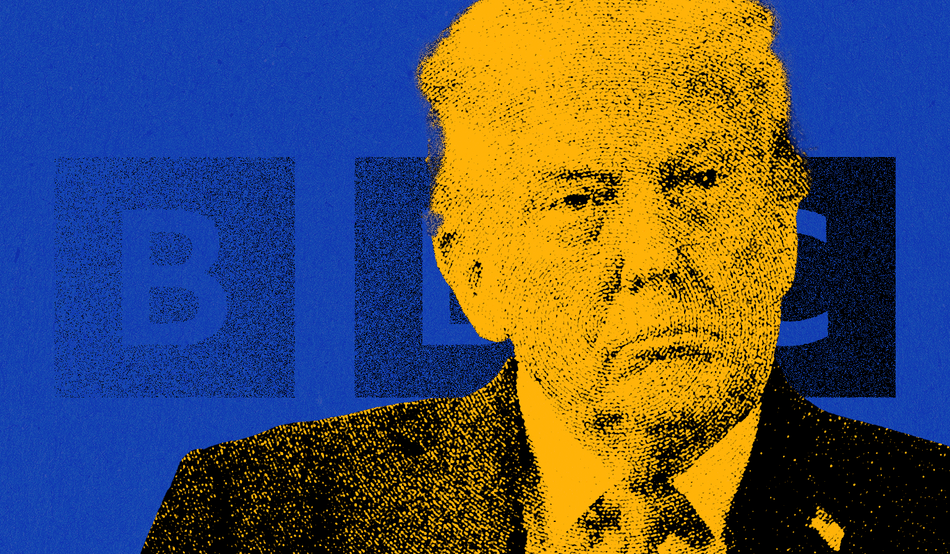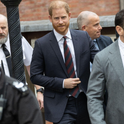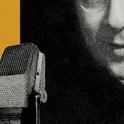It may not have been a coup, but whoever leaked the so-called Prescott dossier on allegations of BBC bias to the Telegraph three weeks ago—“Not Me Guv!”—certainly pulled off a PR coup.
You will remember the outpouring of seismic outrage earlier this month as the Telegraph skilfully dribbled out selected highlights from a report written by Michael Prescott, a former adviser to the BBC, suggesting that the national broadcaster was woke to its roots and more or less beyond salvation.
Former prime minister Boris Johnson—that paragon of journalistic integrity—threatened to refuse to pay the licence fee, and urged his readers to do the same. By the end of a week in which the BBC took a Trappist vow of silence, the apparent crisis had become a tsunami, with the Trump White House offering to shake down the corporation for $5bn while branding it “100 per cent fake news”.
It was such an existential moment for the organisation that the director general and head of news walked the plank and a non-exec director resigned from the board. A few stunned survivors could be seen picking their way through the smoking wreckage.
Cut to yesterday afternoon, when some of the central characters blinked their way into the daylight of the Commons Media Culture and Sport Committee to be interrogated about their part in it. “Interrogated” is not quite the right word. The questioning would not have been out of place at a rural Quaker meeting house.
After more than three hours of gentle nudging one could be forgiven for asking what all the fuss was about. One of the world’s greatest news organisations had been brought to the brink of corporate meltdown by… what, exactly?
Prescott, nearly 25 years a PR man and not lacking in self-confidence, was at one point effusive in praise of the institution he was apparently on a mission to rescue from itself. “The BBC gets as close as any organisation in the world ever has [to being an effective and trusted arbiter of impartiality],” he gushed. Was it institutionally biased? No.
Wait? What? Hold on. But then why was your dossier used so gleefully as evidence that the BBC was a broken, liberal shadow of its former self? Why go to the bother of writing to the entire board—and then Ofcom, the regulator—with the 20-page screed about Trump, trans, decolonised history, Israel and so on?
He conceded the now-notorious Panorama edit might have been an accident. “Tons of stuff the BBC does is world class, both factual programming and non-factual programming. I think the standard of BBC Westminster is exemplary, and that’s why I keep saying these were incipient problems. We were finding the odd problem here, the odd problem there.” He mumbled about “systemic causes”, which were apparently different from institutional bias. Of which there was none.
You had to trust him, he was a centrist dad, he had no political skin in the game. But he did think the Panorama programme—much of which consisted of fanatically loyal Trump supporters saying what a great guy he was—was aggressively biased against the would-be president. What he wanted, speaking as a centrist dad who had long ago given up journalism for corporate PR, was an equally “aggressive” programme about Vice-President Harris.
And suddenly you thought two things: 1) Maybe it was a good change of career for you, Michael? Perhaps you weren’t cut out for a life of making nuanced editorial judgements at the highest level? And 2) How strange that a great journalistic organisation like the BBC—pretty much admired around the world for what it does—should have felt that you were just the chap to advise it on how to do journalism?
Rather more impressive was his fellow editorial adviser, Caroline Daniel, once of the Financial Times. In her view, the BBC actively engaged in impartiality and was a “really healthy organisation”. She drily described Prescott’s selective use of material to compile his dossier as “a personal account rather than a comprehensive review”. She was not so subtly signalling to the committee that her colleague had cherry-picked the bits which suited his centrist dad world-view.
Next up was Prescott’s friend, Sir Robbie Gibb, the former bone-dry Conservative spin doctor, who also denied having a hand in leaking the dossier to the Telegraph.
He, too, was adamant that the BBC wasn’t institutionally biased.
With him was the chair, Samir Shah, who spoke at some length about why the BBC, which employs around 5,000 people who are in the communications business, had said nothing at all during the first week of Telegraph outpourings.
The words came tumbling out, but it was not entirely clear what they meant. He was pressed as to why he himself had chaired two editorial committees—in January and May—which had decided not to take any action about the Panorama programme until it found its way onto the front page of the Daily Telegraph in November. Again, his reasoning was not easy to follow.
Everyone agreed that Tim Davie was a simply outstanding DG and really shouldn’t have been allowed to leave. By the end of three hours it wasn’t really clear why he had, in fact, been allowed to do so.
There was much talk of “weaponisation”. The so-called dossier, such as it was, had been weaponised by people who wished the BBC ill. And Sir Robbie complained that it has been weaponised by people who thought he was a biased Tory spin doctor whereas, in fact, that was only a small part of who he was, and he would instead be remembered as someone who had impartiality running through his DNA. Like a stick of Brighton rock.
Someone mentioned his time as 100 per cent owner of the Jewish Chronicle, a paper denounced by one of its leading writers as “a partisan, ideological instrument, its judgements political rather than journalistic”. Oh, that was after my time, he said. And, besides, he had “no editorial involvement whatsoever”.
As her late Majesty, Queen Elizabeth II said so memorably of her grandson and her daughter-in-law’s interview with Oprah Winfrey, “recollections may vary”.
His memory clearly differs from former JC reporter, Lee Harpin, who just a year ago wrote a rather detailed Substack column in which he recalled that Gibb “made a habit of calling into the office on print days early after the new owners took control to check up on what stories were topping the news list, and offering a view”.
Harpin also remembered being interviewed for the job of deputy editor by Gibb in plush offices just off Trafalgar Square. The role went instead to Jake Wallis Simons, later promoted to editor, in which role he presided over the exodus of its five most high-profile columnists, who could no longer stomach what the paper had become.
Perhaps the committee chair, Caroline Dinenage, might like to put Mr Harpin’s recollections to Sir Robbie just to clear up what could well be a misunderstanding. It’s so important to get the record straight.
Though he cannot himself see it, Sir Robbie’s conflicts of interest are so glaring as to be visible from outer space. But, being a Boris Johnson appointment, he is, by some Alice in Wonderland logic, unsackable. So the BBC’s governance arrangements will have to be reconfigured to reduce his baleful influence.
Mr Wallis Simons, in his fun through-the-looking-glass way, yesterday described the changes as “the BBC taking bold steps to ensure that it is even more left-wing than it is already”.
But don’t blame Sir Robbie for Mr Wallis Simons. Like Macavity, he wasn’t there.
For the past two crucial meetings of the Editorial Standards and Guidelines Committee—during which they have discussed the BBC’s coverage of Israel-Gaza—he was the only external voice on the weird little four-person committee which sits in judgement on the work of 5,000 journalists. But Sir Robbie cannot see a problem because he, himself, is convinced that he is the very embodiment of BBC impartiality. He was going nowhere. He had done nothing wrong.
So, at the end of three hours, there was nothing much to write home about. A force 10 typhoon had just ripped through a great national institution. But nobody could quite put their finger on why.
The odd problem here, the odd problem there. Everything would be fine.












